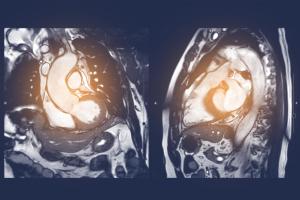Frederick H. Epstein, Ph.D.

About
Fred Epstein is recognized for his contributions to the field of cardiac magnetic resonance imaging. He has been a world leader in advancing MRI myocardial strain imaging by developing and applying the cine DENSE (displacement encoding using stimulated echoes) MRI method. He has also made important contributions to accelerated MRI methods and to methods and applications of preclinical MRI in mouse models of heart disease.
Dr. Epstein has chaired the Science Committee of the Society for Cardiovascular MRI (SCMR) (2008) and the ISMRM Cardiac Study Group (2009). He served as an ad hoc member of the NIH NIBIB Board of Scientific Counselors in 2012 and as an international reviewer for the South African Medical Research Council 5-year review of the University of Cape Town Medical Imaging Research Unit (2010). He was recently a member of the Board of Trustees for the SCMR (2013-2015), and he recently served as a standing member of the NIH Study Section Biomedical Imaging Technology A (2012-2016). He is currently a Deputy Editor for Magnetic Resonance in Medicine (2011 – present, the leading technical journal devoted to MRI physics and engineering), and is a member of the American Heart Association Mid-Atlantic Affiliate Research Committee (2014-2017).
Dr. Epstein was the only biomedical engineer invited to speak at the American College of Cardiology Think Tank on the future of cardiac imaging in Washington, DC in 2015. Dr. Epstein was the elected Chair of the American Institute for Biological and Medical Engineering (AIMBE) Academic Council, a group comprised of all BME Department Chairs across the nation. For contributions to research and service, Dr. Epstein is an elected Fellow of three major societies: ISMRM (2013), the American Institute for Biological and Medical Engineering (2014), and the American Heart Association (2014).
Education
B.S. in Physics, University of Rochester, 1988
M.S. in Engineering Physics, University of Virginia, 1990
Ph.D. in Biomedical Engineering, University of Virginia, 1993
Post-Doc in Radiology, University of Virginia, 1994
Our lab develops new MRI methods for imaging the heart. Some of our methods are used world-wide for clinical imaging or research studies.
Research Interests
Selected Publications
D. Kim, W.D. Gilson, C.M. Kramer, F.H. Epstein
B.S. Spottiswoode, X. Zhong, E.M. Meintjes, B.M. Mayosi, C.M. Kramer, F.H. Epstein

